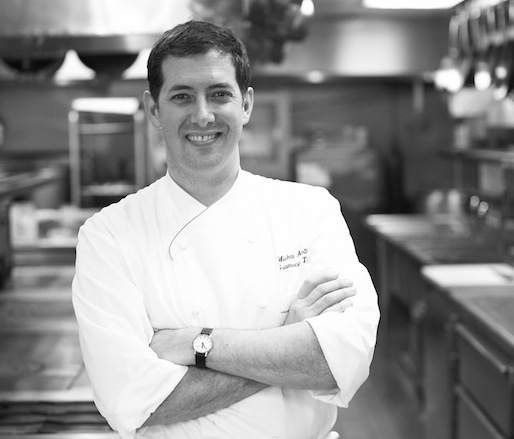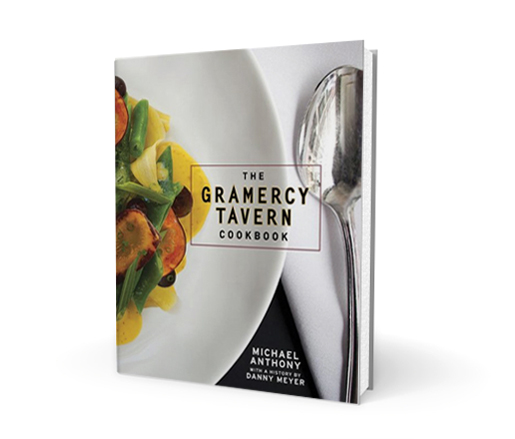
Every year brings a fresh crop of dazzling, restaurant-driven cookbooks that renew our resolve to soar toward new technical heights in our home kitchens. But whether we actually reach those summits of thermal circulators and immaculate brunoise… well, that’s another story. This year’s batch included the eponymous title from New York City’s Gramercy Tavern, a restaurant anchored by a kitchen that’s never short on solid technique. But lightning-fast knife skills aside, JBF Award winner Michael Anthony says that The Gramercy Tavern Cookbook can actually make the leap from coffee table to kitchen counter. Intertwining two decades of the iconic restaurant's history with 125 seasonally inspired, contemporary American recipes, Anthony has crafted an invaluable resource for novices and seasoned chefs alike. Read on to learn about his favorite flavor combinations, his take on the recent vegetable boom, and how Gramercy Tavern gives back to the community.
(Join Anthony tomorrow at noon for a special installment of our Beard on Books series at the Beard House.)
JBF: What was your vision behind this cookbook?
Michael Anthony: I wanted to tell Gramercy Tavern’s rich, two-decade story and talk about our style of local, seasonal cooking in a way that was truly approachable for home cooks. I like to cook this way at home, and I made the kind of adjustments to the recipes that I instinctively make when I’m cooking at home alone rather than at the restaurant with a full kitchen team. The book turned out to be so much more than cookbook; it’s an insider’s look at our team—the people who live and work in the restaurant and make it so special. Our 20th anniversary is actually coming up this July, so the timing couldn’t have been better.
JBF: There’s a heavy focus on vegetables in the book, which reflects a wider trend in the industry. Can you speak to the increasing interest in vegetable-focused cooking?
MA: Vegetables tend to steal the spotlight in many of our dishes at Gramercy Tavern, and I think it’s simply because seasonal vegetables are what keep our menus authentic to our region. Highlighting the seasonal availability of vegetables in the Northeast is our way of celebrating what’s special about eating here. This is a subject that has dominated our thinking at the restaurant; we even offer a vegetable tasting menu. I’m so excited about this subject that I’m writing about it in more detail in a second cookbook project, which focuses on vegetable cookery, due out in 2015.
JBF: Do you have a favorite vegetable?
MA: It depends on the moment. My favorite vegetable is always changing. Answering this question in the middle of the winter, I’m completely excited about kabocha squash. If you asked me in August or September, I would probably say eggplant. In mid July, it’s tomatoes. In early June, it’s English peas. Vegetables provide us with the chance to pay more attention to the changing seasons around us and they keep our lives connected to the natural world.
JBF: Your cookbook is organized by season. Can you tell us how seasonality affects Gramercy Tavern?
MA: Gramercy Tavern is on 20th Street between Park Avenue and Broadway in Manhattan, an exciting location for us because we are so close to the Union Square Greenmarket, which we visit every day that it’s open. As city dwellers, we can feel insulated from nature, but the seasonal menus that we serve at Gramercy Tavern really reflect the time of year.
JBF: Which is your favorite season to cook in, and why?
MA: I like autumn the best because we have the abundance of everything that the summer sun has produced, but the cool air reminds us that it’s all fleeting.
JBF: How do you define “American” cooking?
MA: American cooking is all about liberation, because we’re not bound by any one tradition. American chefs, now more than ever, share a refreshingly healthy approach to cooking that’s built on a renewed interest in local, sustainable agriculture. We have the freedom to serve flavors with high notes based on acidity, low notes based on fermented foods with an earthy quality, and spices that go beyond most conventional traditions. It’s an incredibly exciting time to be an American chef—or diner.

JBF: What’s your favorite recipe from this cookbook?
MA: That’s like asking which of my three daughters is my favorite; there’s no way I can choose! Although I can’t play favorites, I will say that the Hot-Smoked Trout with Pickled Cipollini Onions is a classic Gramercy Tavern dish that epitomizes our food philosophy, because it takes simple ingredients and presents them in a way that’s not overly manipulated.
JBF: What are a few of your current favorite flavor combinations?
MA: Miso and soy with roasted vegetables. Saffron, fennel, and orange juice. Garlic, oregano, and chile flakes with anchovies.
JBF: How do you balance maintaining the authentic “neighborhood feel” that Danny Meyer set out to create in Gramercy Tavern, along with producing some of the country’s most acclaimed cuisine?
MA: It all boils down to making our employees, as well as our customers, feel safe, confident, and needed in a very genuine way. If everyone looks forward to coming to work, they are able to respond creatively to each and every new day, and that’s a palpable feeling. As a guest you can truly see it and feel it.
JBF: Gramercy Tavern is clearly big on community spirit. How does the restaurant get involved with its neighbors?
MA: We use healthy, local food as a vehicle to share awareness about eating well. This is actually our eighth year working with a local elementary school, P.S. 41, where we’ve created a food study program that helps first graders recognize the natural world around them and make food and eating well a priority in their lives. We get the opportunity to visit with the students at the school, then again at Gramercy Tavern, and finally at the Union Square Greenmarket. Our team has also developed a special relationship with God’s Love We Deliver, finding opportunities to volunteer with the organization and participating in their annual Race to Deliver. This year, I am thrilled to join the GLWD board as a member and continue to grow our relationship. Their philosophy of food-as-medicine, and improving the health of people living with serious illness through nutritious meals and food education, really resonates with us.
Elena North-Kelly is associate editor at the James Beard Foundation. Find her on Twitter and Instagram.



-57 web.jpg)


